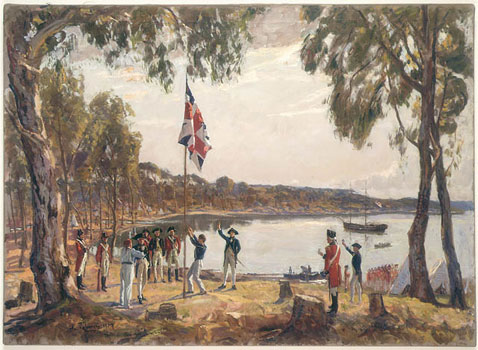“I acknowledge the Federal Commonwealth, created by the nation under the Crown to defend its undivided sovereignty over all Australia’s lands and waters.
“I acknowledge the Christian Anglo-Celtic pioneers and founders of the Australian nation.
“And I acknowledge the aboriginal peoples who first occupied this land.”
According to the Explanatory Note for the above “Acknowledgment of Nation”, the text is “intended as a replacement for the present ‘acknowledgment of country’ ritual presently being forced on school children and and citizens throughout Australia.”1 Furthermore, that present ritual “is generally inappropriate because it symbolically alienates the nation from its homeland.”
Although the “acknowledgment of country” is intended to redress perceived injustices perpetrated upon the Aboriginal peoples since Settlement – and specifically, the denial of their peoplehood and status as the first inhabitants of the Australian continent – its has effectively become a politicised (and racialised) act of collective guilt inducement. The current ritual is a divisive display of minority ethnic group identity which delegitimises the achievements of the foundational people of the Australian Commonwealth. Instead of bridging the gap between Australians of Aboriginal or Settler descent, it has highlighted and therefore reinforced that difference. It is not a solution, it is part of the problem.
Unfortunately, there appears to be a bi-partisan support for its underlying ideology: pioneered as it was by agitators of the political left, today even the non-Labor parties under the stewardship of Prime Minister Tony Abbott have attempted to reassert themselves as a vanguard of Aboriginal identity politics.2 The proposed “Acknowledgment of Nation” seeks to redress this assault on Australia’s traditional identity. The commentary in the Explanatory Note explains that:
The Acknowledgment is designed to be modular and prioritised. The three acknowledgments – of Commonwealth, nation, and indigenous peoples – are in order of importance, though the order could be changed to suit circumstances. Expression of fealty to the state should come first for all Australian citizens following Jesus’s injunction to “render unto Caesar the things that are Caesar’s”. This respects the legal and moral obligations of citizenship. The historic nation has next priority because it was the first Australian nation and created the Commonwealth, characteristics that satisfy the historical criterion. In addition it deserves special recognition because it represents continuity of identity stretching back to the emergence, in the second half of the nineteenth century, of national feeling among people who thought of themselves as a branch of the British people. That consciousness and descent connected the new nation to the First Fleet of 1788, to Britain, the English nation, Christendom and its European precursors in ancient times. In that sense the Australian nation is not so young as often supposed. In addition the descendants of the historic nation remain the largest ethnic group in Australia. It is the leading culture in the sense that all other ethnicities tend to assimilate into it more than vice versa. Finally the historical principle requires that indigenous peoples should be acknowledged to complete recognition of the country’s origins, in the spirit of recognising those who were the first to identify with the lands and waters that make up Australia. Any recognition of origins demands acknowledgment of Aborigines and Torres Strait Islanders, whether one believes that their lands were annexed or conquered by the British, and despite their being marginal to the identity of those who founded the nation and the establishment of the Commonwealth.
For more information, readers are encouraged to visit the Social Technologies website where they can find further commentary outlining the purpose and function of the proposed “Acknowledgment of Nation”.
– SydneyTrads Editors
Endnotes
- “Acknowledgment of Nation” Social Technologies website (23 December 2014) <socialtechnologies.com.au> (accessed 27 December 2014).
- For more information, see the collection of critical essays in Gary Jones (ed.) Recognise What (Connor Court, 2014).






The Acknowledgment of Nation is certainly better than the Welcome to Country which has become the custom in recent times. However I’m conflicted about whether we need a replacement, I always thought we should just get rid of the Welcome to Country. I’ll have to think on this issue some more.
Mark Moncrieff
Upon Hope Blog – A Traditional Conservative Future